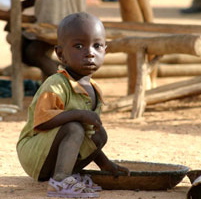LONDON -- Advocates of a global overhaul of efforts to meet the needs of the world's 850 million chronically hungry people have received a boost with the decision by CARE, a top U.S. aid organization, to walk away from tens of millions of dollars in annual U.S. federal financing. In opting out of the mechanism by which donated U.S. food aid is transported overseas and sold in local markets to fund anti-poverty programs -- a decades-old process known as monetization -- CARE joins a growing number of international non-governmental and governmental groups demanding an end to a policy they say can be harmful to the countries being helped. "It's not the best way to use food, to generate cash, and it's quite clear that it's not cost-effective," said David Kauck, a senior technical advisor with CARE USA about the organization's decision to completely phase out monetization by 2009, which made headlines earlier this month with CARE's announcement it would forego $45 million in federal funding this year.
Rejection of U.S. Food Aid by NGO Signals Change in Global Hunger Policy

